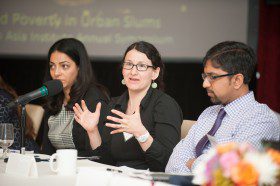This is the third article in a series highlighting SAI’s ongoing research projects that were featured at SAI’s Annual Symposium ‘South Asia: Local Solutions with Global Impact‘ in April.
By Divya S. Sooryakumar, International Education Policy, Ed.M Candidate, Harvard Graduate School of Education
Approximately 768 million people in the world lack access to safe water sources, a problem addressed during a panel at the Harvard South Asia Institute’s Annual Symposium on April 17, 2015. Water and Poverty in Urban Slums focused on the research being undertaken by SAI, looking at the intersection of access to water and urban slum communities.
In an attempt to better understand the nature of the problem, each of the panelists focused on a different aspect of water access and urban slum communities. Liza Weinstein, Assistant Professor of Sociology, Northeastern University, kicked off the conversation by sharing her research on slum communities in Mumbai. All too often, slums are understood as just a housing problem. In reality, they are housing, economic, sanitation, and rights-based problems as well. Further complicating the dialogue is the diversity of slum communities across the world. There is a deep-seeded history in the social and political landscapes of these communities, that greatly affects sanitation and access to water.
Sharmila Murthy, Assistant Professor of Law, Suffolk University; Visiting Scholar, Sustainability Science Program, Harvard Kennedy School, discussed the legal barriers that exist in slum communities. The ability to demand rights depends greatly on one’s property legality, which makes rights complicated for “illegal” slums. For example, Murthy highlighted the shifting laws in Mumbai that granted legal status to certain slum communities who had been present in the city before a certain date. This legality allowed these communities to access water supplies.
Ramnath Subbaraman, Associate Physician, Brigham and Women’s Hospital; Research Advisor, Partners for Urban Knowledge, Action, and Research (PUKAR), Mumbai, India, the effcts of a lack of access to a regular water supply in Mumbai, what he termed as “water poverty.” His research has uncovered that lack of access to water including negatively effects school and work life. There is immense price discrimination against the poor, for example having to “buy” water from sources other than the municipal supply at rates up to more than 200% of what people regularly pay.
Shafiqul Islam, Director, Water Diplomacy Program, Professor, Department of Civil and Environmental Engineering, Professor, Water Diplomacy, The Fletcher School of Law and Diplomacy, Tufts University, spoke about the adaptive problem that is water. No one can clearly identify the problem and no one can agree upon one solution. He explained that this has caused the water problem to stay stagnant for years. He identified that it is important to produce information regarding the issue that propels people to act, further stating that we need to produce the type of information that will allow us to have an impact on the problem in 1-2 years.
Heather Arney, Senior Manager of Information, Evaluation, and New Ventures, Water.org, spoke about the work of Water.org, and their innovative platform in which they work with “water credit”. Water credit is essentially a partnership with microfinance organizations that allows individuals to purchase water as they need it. With 99 percent repayment rates on their water credit model, the work of Water.org is being hailed as revolutionary in the communities that are affected by lack of access to safe water.
The next steps for this research project: An interdisciplinary team at SAI will research addressing water problems in South Asia as a human rights issue. Research the team will continue on the ground to address how to diagnose, characterize, and develop solutions to address water poverty in urban slums.

